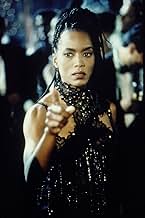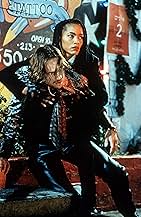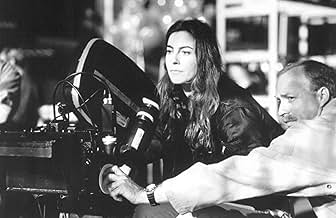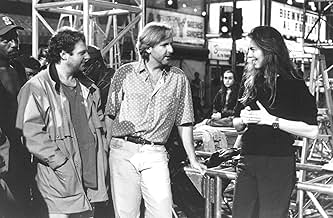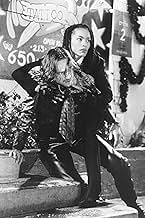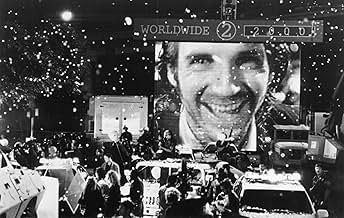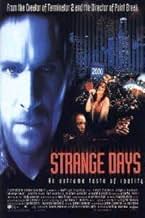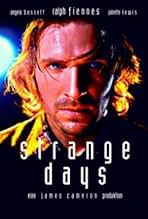En 1999, un ancien policier devenu escroc découvre sans le vouloir un complot à Los Angeles.En 1999, un ancien policier devenu escroc découvre sans le vouloir un complot à Los Angeles.En 1999, un ancien policier devenu escroc découvre sans le vouloir un complot à Los Angeles.
- Réalisation
- Scénario
- Casting principal
- Récompenses
- 2 victoires et 4 nominations au total
Avis à la une
Strange Days is a truly astonishing science fiction offering, part scripted by James Cameron and directed with relentless panache by maverick lady-director Kathryn Bigelow. It presents a depressing and bleak, yet worryingly probable, view of the near future, and hooks its story threads upon the impending millennium eve celebrations. Although December 31st, 1999, has been and gone since the making of this movie, it is a credit to the makers that this film still offers a plausible viewpoint about where the world might be at in the next decade or so.
Ralph Fiennes seems initially miscast, but soon wins over the audience as Lenny Nero, a sleazy racketeer who sells "memories" captured on some form of disk, similar to virtual reality but recorded from real experiences rather than computerised ones. He is desperately trying to get back with his ex-girlfriend Faith (Juliette Lewis), but she doesn't want him as she has hooked up with a music producer named Philo (Michael Wincott). Lenny acquires two disturbing tapes, one showing the rape and murder of a woman, the other showing a racially motivated slaying, and before he knows it he is on the run from the culprits who want to kill him before he exposes their crimes. The only person he can trust is his best friend, lady bodyguard Mace (Angela Bassett). To complicate matters further, his ex-girlfriend Faith seems to know something about the disks, and may either be involved in the crimes or at great risk from those responsible.
Bassett is the real star here, in the role of a lifetime as a morally strong and physically stronger heroine. Lewis plays the same old white trash girl she has played many times, but at least she has the experience to bring total conviction to the role. The production values are incredibly high, especially the party at the end which seems to realistically convey an entire city celebrating in the streets. The plot unfolds slowly, but this is a strength rather than a criticism. Each new development slots into place beautifully, and the audience is given time to get into the characters and the situations (which, in too many movies, we are not allowed to do since the pace is often too frenetic).
Strange Days is challenging and aggressive and frequently disturbing. It is also inventive and exciting and ingeniously staged. It is simply a terrific science film which any devotee of the genre absolutely must see.
Ralph Fiennes seems initially miscast, but soon wins over the audience as Lenny Nero, a sleazy racketeer who sells "memories" captured on some form of disk, similar to virtual reality but recorded from real experiences rather than computerised ones. He is desperately trying to get back with his ex-girlfriend Faith (Juliette Lewis), but she doesn't want him as she has hooked up with a music producer named Philo (Michael Wincott). Lenny acquires two disturbing tapes, one showing the rape and murder of a woman, the other showing a racially motivated slaying, and before he knows it he is on the run from the culprits who want to kill him before he exposes their crimes. The only person he can trust is his best friend, lady bodyguard Mace (Angela Bassett). To complicate matters further, his ex-girlfriend Faith seems to know something about the disks, and may either be involved in the crimes or at great risk from those responsible.
Bassett is the real star here, in the role of a lifetime as a morally strong and physically stronger heroine. Lewis plays the same old white trash girl she has played many times, but at least she has the experience to bring total conviction to the role. The production values are incredibly high, especially the party at the end which seems to realistically convey an entire city celebrating in the streets. The plot unfolds slowly, but this is a strength rather than a criticism. Each new development slots into place beautifully, and the audience is given time to get into the characters and the situations (which, in too many movies, we are not allowed to do since the pace is often too frenetic).
Strange Days is challenging and aggressive and frequently disturbing. It is also inventive and exciting and ingeniously staged. It is simply a terrific science film which any devotee of the genre absolutely must see.
Besides the amusing "futuristic" 1999 this movie hasn't aged badly at all. It is a still a great sci-fi thriller and also benefits from very good acting performances.
'Memories were meant to fade' and some years after its release this has become a little diminished and less visible, especially as it attempts to forecast a technological future that even today is somewhat ambitious.
Always tricky predicting what's to come, although this does foresee with great clarity abuse by those in authority against the same classes and races that are so disenfranchised today - but maybe that wasn't such a big gamble to take. If I had a crystal ball I would foresee the same continuing for another twenty five years and quite probably in perpetuity.
All in all a reasonable variation on a theme you have seen plenty of before and will continue to do so if this is your bag.
Always tricky predicting what's to come, although this does foresee with great clarity abuse by those in authority against the same classes and races that are so disenfranchised today - but maybe that wasn't such a big gamble to take. If I had a crystal ball I would foresee the same continuing for another twenty five years and quite probably in perpetuity.
All in all a reasonable variation on a theme you have seen plenty of before and will continue to do so if this is your bag.
The answer being, of course, yes I am impressed.
What a thoroughly enjoyable film Strange Days is. Fast-moving and occasionally violent, it's not high art but then neither is it dumbed-down fodder and it has much to commend it. The central plot revolves around an ex-cop (Fiennes, doing a - to my ears anyway - convincing American accent) peddling FBI technology on the black market. The SQUID technology (Super conducting QUantum Interface Device) electronically absorbs information from the central cortex and allows users to experience the thrill of another's sensations - be it murder, sex, robbery, etc. Of course, this central idea, while fascinating, does derive pretty much directly from a Twilight Zone episode. Were this a "classic" Zone episode from the b/w era, then people would have picked it up straight away and the game would be over. As it is, the inspiration comes from one of the colour Twilight Zone episodes which had even less viewers than Strange Days and so the movie can rest assured it is safe in obscurity. (Give up? Okay, it was episode 23, season three, 1989, "The Mind of Simon Foster". I'm an anorak, I know these things).
But whether such were intentional is pretty much irrelevant as the magpie technique of this film takes from many texts and builds something greater than the parts. One of the two greatest science fiction films of the 90s - the other being the excellent "Twelve Monkeys" - both have built-in sell-by dates by fixing their time period in a very near locale. Hence while the supposed date of Monkeys is long past at 98, this film now becomes a historical document as of New Year's Eve 1999. But then does it follow that we will stop watching 2001 in 2002? Hopefully not, and Strange Days is one that too deserves to be revisited in years to come.
The reason why I commend it most is its rewarding political stance. The development that gets adhered onto the "Squid" plot directly references the beating of Rodney King. Such contemporary referencing may again date it as quickly as the '99 setting, but then we also have Angela Bassett as a very empowered, yet caring black woman. Note how she and Lenny have exchanged traditional gender roles in this film, yet this feels not like some "macho woman" schtick but genuine characterisation. Lenny is a likeable, wisetalking street peddler who spends the film as a human punchbag. Gone is the cliched jaw-breaking action man role for him, instead his only retort to violence is "I'll give you my Rolex". This sense of, if you like, PC-ness, can also be evidenced with the lesbian couple kissing as the year 2000 breaks, or the (one scene only, admittedly) appearance of a disabled man as a central character.
However, the boundary-pushing elements of this movie are tainted by the appearance of Juliet Lewis in the film. A capable actress, her only role appears to be as a receptacle for various men's sexual needs or to gratuitously expose her breasts on multiple occasions. This is a great shame, and a pity that a film which has such high intentions in almost every other area should fall back on unfortunate portrayal.
The dialogue is pitched just about right without being particularly clever, though occasionally it stalls. "You're like a goddamn cruise missile, targetted on making it", Fiennes tells Faith (Lewis) at one point, managing to keep a straight face. Later, Bassett must endure having to say "These are used emotions. It's time to trade them in" and not use her gun on the scriptwriter. When the credits do roll, it's perhaps no surprise that James Cameron was the co-writer, as its slight perfunctory, by-the-numbers stance often reminds one of the machinations of "Titanic". Tom Sizemore as Max is every inch the one-dimensional Cameron "character", while plot twists sometimes feel heavily engineered. Maybe Jay Cocks is responsible for the script's more "human" feel, with particular note going to the moral debate of whether or not to expose the LAPD's murder of an influential black rapper. The two leads debate (internally, as well as verbally, a first for a Cameron movie) the implications and the possible consequences of such an action. Despite its flirtation with the mainstream, Strange Days is a film that dares to pervert the traditional course of Hollywood into a future that is worth seeing. Perhaps predictably, it made little impact at the box office.
What a thoroughly enjoyable film Strange Days is. Fast-moving and occasionally violent, it's not high art but then neither is it dumbed-down fodder and it has much to commend it. The central plot revolves around an ex-cop (Fiennes, doing a - to my ears anyway - convincing American accent) peddling FBI technology on the black market. The SQUID technology (Super conducting QUantum Interface Device) electronically absorbs information from the central cortex and allows users to experience the thrill of another's sensations - be it murder, sex, robbery, etc. Of course, this central idea, while fascinating, does derive pretty much directly from a Twilight Zone episode. Were this a "classic" Zone episode from the b/w era, then people would have picked it up straight away and the game would be over. As it is, the inspiration comes from one of the colour Twilight Zone episodes which had even less viewers than Strange Days and so the movie can rest assured it is safe in obscurity. (Give up? Okay, it was episode 23, season three, 1989, "The Mind of Simon Foster". I'm an anorak, I know these things).
But whether such were intentional is pretty much irrelevant as the magpie technique of this film takes from many texts and builds something greater than the parts. One of the two greatest science fiction films of the 90s - the other being the excellent "Twelve Monkeys" - both have built-in sell-by dates by fixing their time period in a very near locale. Hence while the supposed date of Monkeys is long past at 98, this film now becomes a historical document as of New Year's Eve 1999. But then does it follow that we will stop watching 2001 in 2002? Hopefully not, and Strange Days is one that too deserves to be revisited in years to come.
The reason why I commend it most is its rewarding political stance. The development that gets adhered onto the "Squid" plot directly references the beating of Rodney King. Such contemporary referencing may again date it as quickly as the '99 setting, but then we also have Angela Bassett as a very empowered, yet caring black woman. Note how she and Lenny have exchanged traditional gender roles in this film, yet this feels not like some "macho woman" schtick but genuine characterisation. Lenny is a likeable, wisetalking street peddler who spends the film as a human punchbag. Gone is the cliched jaw-breaking action man role for him, instead his only retort to violence is "I'll give you my Rolex". This sense of, if you like, PC-ness, can also be evidenced with the lesbian couple kissing as the year 2000 breaks, or the (one scene only, admittedly) appearance of a disabled man as a central character.
However, the boundary-pushing elements of this movie are tainted by the appearance of Juliet Lewis in the film. A capable actress, her only role appears to be as a receptacle for various men's sexual needs or to gratuitously expose her breasts on multiple occasions. This is a great shame, and a pity that a film which has such high intentions in almost every other area should fall back on unfortunate portrayal.
The dialogue is pitched just about right without being particularly clever, though occasionally it stalls. "You're like a goddamn cruise missile, targetted on making it", Fiennes tells Faith (Lewis) at one point, managing to keep a straight face. Later, Bassett must endure having to say "These are used emotions. It's time to trade them in" and not use her gun on the scriptwriter. When the credits do roll, it's perhaps no surprise that James Cameron was the co-writer, as its slight perfunctory, by-the-numbers stance often reminds one of the machinations of "Titanic". Tom Sizemore as Max is every inch the one-dimensional Cameron "character", while plot twists sometimes feel heavily engineered. Maybe Jay Cocks is responsible for the script's more "human" feel, with particular note going to the moral debate of whether or not to expose the LAPD's murder of an influential black rapper. The two leads debate (internally, as well as verbally, a first for a Cameron movie) the implications and the possible consequences of such an action. Despite its flirtation with the mainstream, Strange Days is a film that dares to pervert the traditional course of Hollywood into a future that is worth seeing. Perhaps predictably, it made little impact at the box office.
"Strange Days" is a unique science fiction and mystery film. Set in Los Angeles during the last two or so days prior to the new millennium, the cast is helmed by Ralph Fiennes as the charming, brave, but shady Lenny Nero. Lenny is a former LAPD officer who loses his job for mostly unknown reasons. He then becomes a black market hustler who sells people's recorded memories for profit. For the most part, these recorded memories are either violent or sexual in nature.
Angela Bassett does a great job complementing Fiennes' "Lenny" character in her role as Macy, Lenny's close friend who makes a more legitimate living as a limo driver and security specialist. Lenny and Macy soon become embroiled in a murder mystery involving corruption within both the LAPD and the music industry. This seemingly ever-deepening mystery also involves Lenny's other close friend, Tom Sizemore's character "Max". Max is a private eye who, despite seeming to be very well-intentioned, is just as shady as Lenny. Juliette Lewis rounds out the cast as "Faith", Lenny's troubled and devious rock singer ex-girlfriend.
Besides the awesome and well-acted performances, what made this movie stand out to me is just how on the nose some of the background references are in it. References to an economic collapse, increasing gas prices, and strained relations between the police and minorities make this a very odd foreshadowing of the actual real-life future.
In conclusion, great acting, a very deep and interesting storyline, and great cultural references make this a very highly recommended film.
Angela Bassett does a great job complementing Fiennes' "Lenny" character in her role as Macy, Lenny's close friend who makes a more legitimate living as a limo driver and security specialist. Lenny and Macy soon become embroiled in a murder mystery involving corruption within both the LAPD and the music industry. This seemingly ever-deepening mystery also involves Lenny's other close friend, Tom Sizemore's character "Max". Max is a private eye who, despite seeming to be very well-intentioned, is just as shady as Lenny. Juliette Lewis rounds out the cast as "Faith", Lenny's troubled and devious rock singer ex-girlfriend.
Besides the awesome and well-acted performances, what made this movie stand out to me is just how on the nose some of the background references are in it. References to an economic collapse, increasing gas prices, and strained relations between the police and minorities make this a very odd foreshadowing of the actual real-life future.
In conclusion, great acting, a very deep and interesting storyline, and great cultural references make this a very highly recommended film.
Le saviez-vous
- AnecdotesJuliette Lewis did all her own vocals for the film for her character Faith's club performance.
- GaffesThe safety cable is visible during the final 10 or 20 feet of Max's fall.
- Versions alternativesThe older special edition laserdisc and DVD are the same. Both formats feature two deleted scenes and other extras. The solitary difference is that the laserdisc contains the Skunk Anansie music video for "Selling Jesus", which was not included on the US DVD release. The only DVD to feature the music video is the German special edition.
- ConnexionsEdited into Strange Days: Deleted Scenes (2002)
Meilleurs choix
Connectez-vous pour évaluer et suivre la liste de favoris afin de recevoir des recommandations personnalisées
- How long is Strange Days?Alimenté par Alexa
Détails
- Date de sortie
- Pays d’origine
- Langues
- Aussi connu sous le nom de
- Días extraños
- Lieux de tournage
- Société de production
- Voir plus de crédits d'entreprise sur IMDbPro
Box-office
- Budget
- 42 000 000 $US (estimé)
- Montant brut aux États-Unis et au Canada
- 7 959 291 $US
- Week-end de sortie aux États-Unis et au Canada
- 31 062 $US
- 8 oct. 1995
- Montant brut mondial
- 7 961 763 $US
- Durée
- 2h 25min(145 min)
- Couleur
- Mixage
- Rapport de forme
- 1.78 : 1(original/open matte)
Contribuer à cette page
Suggérer une modification ou ajouter du contenu manquant


